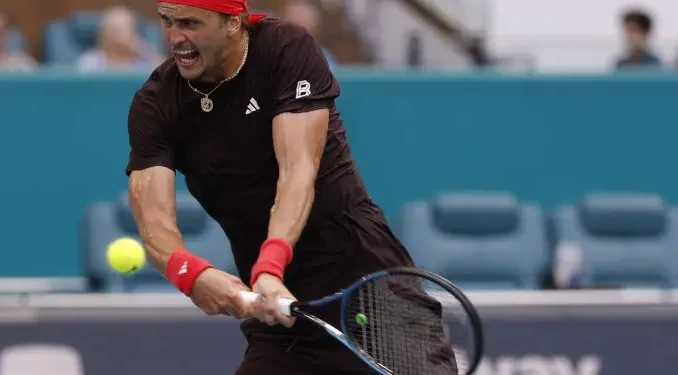
In the high-stakes arena of professional tennis, where every serve and volley can shift the tides of fate, Alexander Zverev stands as a towering figure—both literally and figuratively. The German star, currently ranked world No. 2, has long been seen as a heir apparent to the sport’s throne, a player with the raw talent to claim the top spot and rewrite the record books. Yet, as the 2025 season unfolds, a string of unexpected defeats has cast a shadow over his once-unassailable promise. Enter Boris Becker, the legendary six-time Grand Slam champion and a fellow German, who has stepped into the spotlight with a bold and unflinching analysis of Zverev’s struggles. What he’s uncovered is a revelation that cuts deeper than technique or体力—a shocking truth rooted in the labyrinth of Zverev’s mind.
The story begins with a tantalizing glimpse of glory. Early in 2024, Zverev stormed to the Australian Open final, facing off against the indomitable Jannik Sinner. It was a match that could have been his coronation, a chance to shed the label of “nearly man” after agonizing five-set losses in the 2020 US Open and 2024 French Open finals. But Sinner, the world No. 1, proved too much, handing Zverev a straight-sets defeat that stung more than the scoreboard suggested. What followed was a rollercoaster of disappointment: quarterfinal exits in Argentina and Rio, a first-round stumble at Indian Wells, and a frustrating pattern of squandered leads. For a player who once seemed destined to dominate, these setbacks have left fans and analysts alike scratching their heads. How could someone with such a formidable game falter so consistently?
Becker, speaking with the gravitas of a man who’s scaled tennis’s highest peaks, has zeroed in on the crux of the issue: Zverev’s mental fortitude—or lack thereof. “He is not as convinced of himself at the moment as he was in Melbourne or at the end of last year,” Becker observed, his words carrying the weight of hard-earned wisdom. It’s a diagnosis that cuts through the noise of physical critiques—no one’s questioning Zverev’s blistering forehand or towering serve. Instead, Becker points to an intangible frailty, a wavering self-belief that’s sabotaging Zverev at the critical junctures. Matches against the likes of Arthur Fils, Francisco Comesana, and Tallon Griekspoor—games where Zverev held breaks in decisive sets only to let victory slip away—serve as stark evidence of this inner turmoil.
The tennis icon doesn’t stop at diagnosis; he probes deeper, asking questions that resonate beyond the court. “Can you train something like that? Is there a school for mentality, for self-confidence, for inner peace, for inner faith?” Becker mused, his tone both philosophical and urgent. It’s a challenge to the sport itself, a call to recognize that while training centers in Florida can hone a backhand or boost endurance, the mind remains a frontier less conquered. For Zverev, this isn’t about a lack of effort—his work ethic is legendary, with hours logged on practice courts that would exhaust lesser souls. Yet, as Becker sees it, the difference between triumph and defeat lies in that uncharted territory of the psyche.
Zverev’s journey in 2025 has been a paradox. After Sinner’s three-month suspension opened a window of opportunity, Zverev stood poised to seize the No. 1 ranking. Instead, he stumbled, unable to capitalize on the Italian’s absence. The South American Golden Swing—typically a proving ground for top players—became a quagmire, with losses that defied expectation. North America offered no reprieve, as early exits piled up like unanswered questions. “He’s got the game,” one observer noted, echoing a sentiment shared by many. “But something’s holding him back, and it’s not his opponents.” Becker agrees, suggesting that Zverev’s current battle is less with the players across the net and more with the doubts within.
This isn’t a new narrative for Zverev. His career has been a tapestry of near-misses—three Grand Slam finals, three heartbreaks. The 2020 US Open saw him lead Dominic Thiem by two sets, only to falter in the fifth. The 2024 French Open offered a similar script, with Carlos Alcaraz staging a comeback from a 2-1 deficit. Each loss has chipped away at the confidence that once propelled him to the brink of greatness. Becker’s insight—that Zverev’s self-assurance has dimmed since those heady days in Melbourne—paints a picture of a player at a crossroads. Can he rediscover the swagger that carried him to the Olympic gold in 2021 or the ATP Finals title in 2018?
As Zverev prepares for his next challenge—the Monte-Carlo Masters starting April 7—the stakes couldn’t be higher. The gap to Sinner atop the rankings remains daunting, over 2,000 points, and rising stars like Alcaraz lurk in the wings. Becker’s words linger like a coach’s halftime pep talk: it’s not about the strokes, but the spirit. “He just has to look there, who can take him further, who can help him,” Becker urged, hinting that Zverev’s salvation might lie in finding a mentor to guide him through this mental maze. For now, the tennis world watches with bated breath, wondering if “Sascha” can silence his inner demons and finally claim the crown that’s eluded him. The journey, as Becker sees it, is as enigmatic as it is electrifying—proof that in tennis, the fiercest battles are often fought within.
Leave a Reply